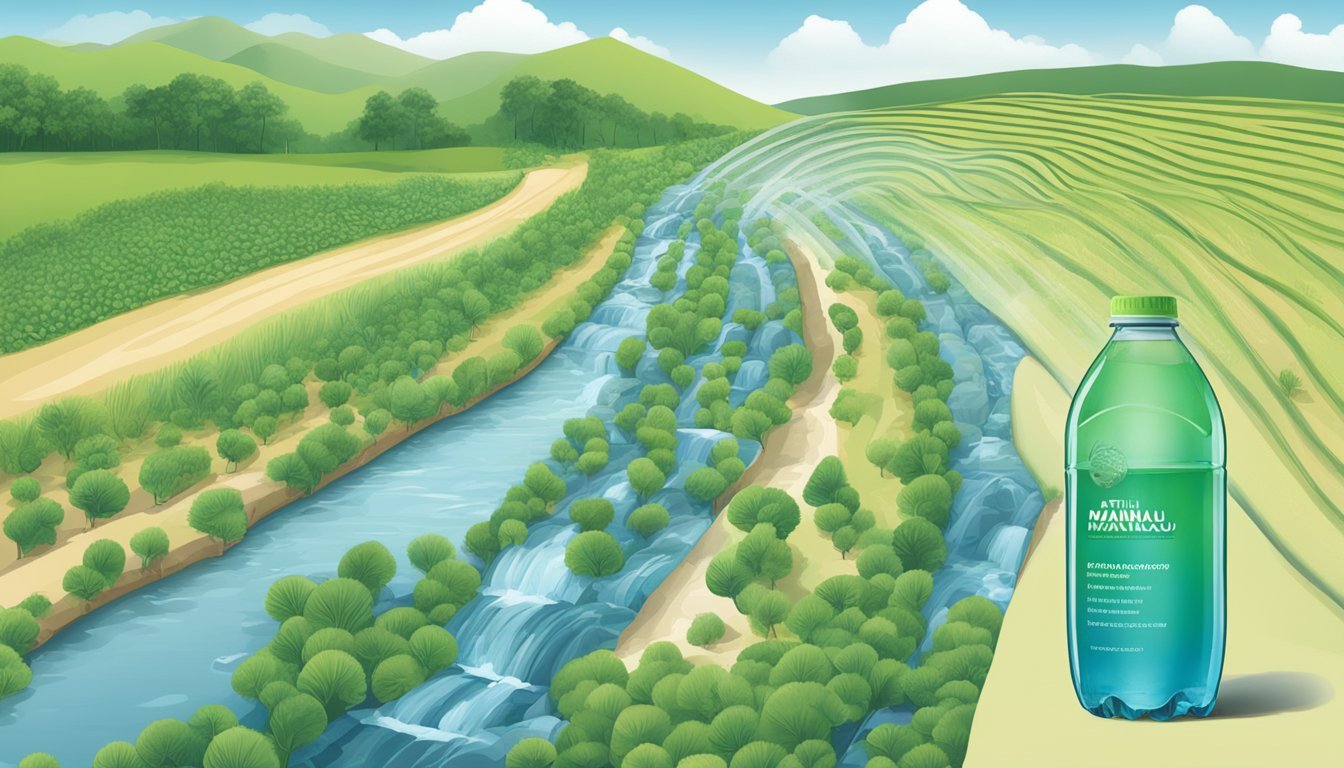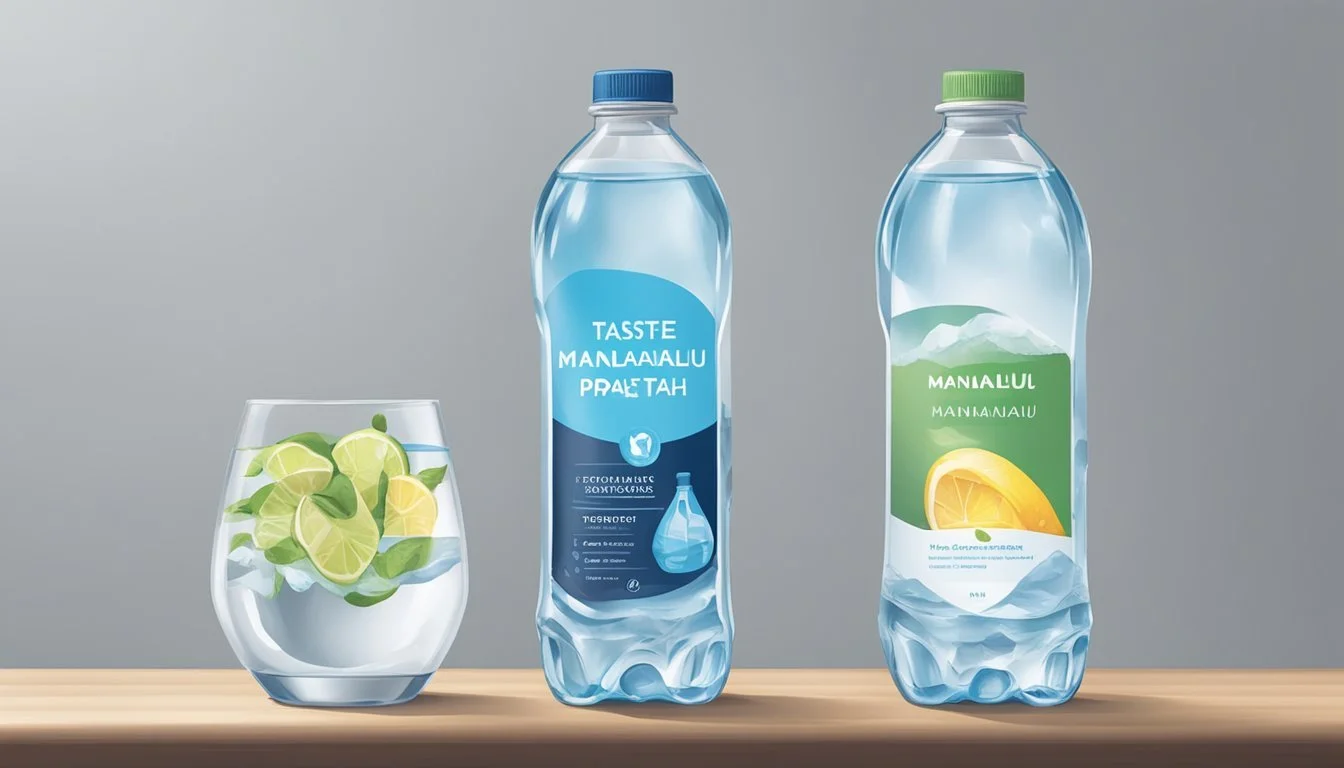Path vs. Mananalu
Which Bottled Water is Better for You?
When it comes to bottled water, Path and Mananalu stand out as notable brands with a focus on sustainability and hydration. Path, known for its durable and refillable aluminum bottles, has been a leader in the market since 2015. Mananalu, founded by Jason Momoa, offers purified water in 100% recyclable aluminum cans, sharing a commitment to reducing single-use plastic waste.
Consumers seeking environmentally friendly bottled water options face a tough decision between Path and Mananalu, as both brands offer high-quality hydration with a reduced ecological footprint. Each brand brings unique innovations to the table, with Path's reusable containers and Mananalu's mission-driven packaging.
By examining the qualities that set Path and Mananalu apart, this post aims to help readers determine which bottled water better aligns with their values and preferences. Whether you're motivated by sustainability or simply want the best-tasting water, understanding the differences between these two leading brands will guide you to an informed choice.
Background on Bottled Water Industry
The bottled water industry has seen significant growth over the past decades, driven by increasing consumer demand and concerns about water quality. Packaging options, particularly regarding plastic and aluminum, play a crucial role in the environmental impact of this industry.
Evolution of Bottled Water Consumption
Bottled water consumption has surged globally. Sales from 109 countries increased by 73% between 2010 and 2020. This growth has made bottled water one of the fastest-growing sectors within beverages. The diversity of options, from budget brands to premium offerings, has contributed to its popularity.
Convenience and perceived purity are primary drivers. Consumers opt for bottled water as an alternative to tap water, seeking a portable and reliable water source. Grocery stores and online platforms like Amazon have expanded accessibility, fueling further demand.
Understanding Plastic and Aluminum Packaging
Packaging's environmental impact is a significant concern. Plastic bottles, often single-use, contribute substantially to plastic pollution. These bottles are prevalent due to low cost and durability, but they typically have low recycling rates. Single-use plastics like these commonly end up in landfills or oceans, causing long-term environmental harm.
Aluminum offers a more sustainable option. Unlike plastic, aluminum bottles and cans are infinitely recyclable. This packaging type is also durable and refillable. Brands like Mananalu promote aluminum packaging to reduce single-use plastic waste, presenting a viable eco-friendly alternative. Recycling aluminum requires less energy and resources, minimizing the environmental footprint.
The industry's shift towards sustainable packaging options reflects increasing consumer awareness and demand for environmentally responsible products.
Assessing Environmental Impacts
Choosing a bottled water brand involves considering many factors, with environmental impact being paramount. This section explores key aspects, such as the carbon footprint and the materials used.
The Carbon Footprint of Bottled Water
Bottled water production and distribution generate significant CO2 emissions. Conventional plastic bottles contribute a disproportionate amount of CO2. Each 50 oz of bottled water can release between 1.6 and 22 oz of CO2.
Path Water, like many bottled water brands, still has a carbon footprint to consider. They focus on reusable bottles, which may lower overall CO2 emissions compared to single-use plastic.
Mananalu, founded by Jason Momoa, aims to eliminate single-use plastic through aluminum bottles. Their mission includes removing ocean-bound plastic, which further reduces the carbon impact by addressing waste directly.
Aluminum vs. Plastic: Ecological Considerations
Aluminum and plastic have different environmental implications. Plastic bottles are notorious for longevity in landfills and marine environments. They contribute heavily to single-use plastics pollution. Despite recycling efforts, much end up in the ecosystem.
Path Water advocates for reusable aluminum bottles, providing a more sustainable solution over time. By encouraging reuse, they reduce the need for new bottles, lowering environmental strain.
Mananalu exclusively uses aluminum cans, which are 100% recyclable. Aluminum recycling is efficient, reducing the need for new raw materials and conserving energy. This approach aligns with eco-conscious consumers and promotes responsible environmental stewardship.
Both brands offer alternatives to traditional plastic bottles, making strides in sustainability and commitment to reducing environmental impacts.
Comparing Path and Mananalu
When comparing Path and Mananalu bottled waters, it is important to consider various factors such as brand mission and philosophy, bottling processes and water sources, and packaging, along with consumer experience.
Brand Mission and Philosophy
Path aims to offer a sustainable alternative to single-use plastic by providing water in resealable, reusable aluminum bottles. They focus on reducing plastic waste and promoting environmental stewardship.
Mananalu, founded by actor Jason Momoa, shares a similar mission. The brand strives to eliminate single-use plastics with their aluminum-bottled water. Their environmental commitment includes removing an equivalent amount of plastic from ocean-bound waste for every bottle sold, known as their "Drink One, Remove One" initiative.
Both brands emphasize sustainability but Mananalu takes it a step further with additional proactive measures to clean the environment.
Bottling Processes and Water Sources
Path sources its water from natural springs in the United States, ensuring it is of high quality and naturally pure. The water undergoes a purification process to maintain its refreshing taste without any contaminants like glyphosate.
Mananalu provides purified water in their recyclable aluminum cans. While specific details on their water sources are less publicized, their focus lies more on the purity and sustainability of their supply chain.
Both brands offer pure and clean water, though Path emphasizes spring sources and natural purity in its branding more distinctly.
Packaging and Consumer Experience
Path offers water in resealable aluminum bottles. This sturdy design not only eliminates plastic but also provides a convenience factor by allowing consumers to reuse the bottle multiple times.
Mananalu similarly uses 100% recyclable aluminum bottles. They are easy to dispose of and recycle, contributing to their mission against plastic waste. Mananalu also partners with rePurpose Global to ensure every purchase has a positive environmental impact.
In terms of taste, consumers might find Path's water crisp and refreshing with a natural feel due to its spring origin. Mananalu's water is described as smooth and purified, potentially influencing taste perception.
Both brands provide a high-quality drinking experience, making the packaging and environmental impact key differentiators for consumers.
Health and Hydration
Individuals seeking the best bottled water prioritize high-quality water, ensuring it supports their health and hydration needs. Comparing Path and Mananalu reveals key aspects like water quality, purity, pH balance, and mineral content.
Analyzing Water Quality and Purity
Path Water undergoes rigorous filtration processes that include reverse osmosis to eliminate impurities. This method helps in achieving a high level of purity, making the water safe and clean for consumption. The absence of contaminants is essential for maintaining optimal health.
Mananalu uses purified water sourced and treated to remove pollutants. Its core mission revolves around sustainability, packaged in 100 percent recyclable aluminum cans. This not only supports environmental health but also guarantees water free from harmful substances typically associated with plastic bottles.
Both Path and Mananalu offer natural and purified water, ensuring purity and safety. Their methods cater to those who prioritize clean and reliable water sources for their hydration needs.
Understanding pH Levels and Mineral Content
Path Water maintains a balanced pH level close to neutral, ideal for general hydration. Drinking water with a stable pH balance supports the body's natural state, preventing acidity or alkalinity issues. Minerals such as calcium and magnesium in Path Water support bone health and muscle function, contributing to overall well-being.
Mananalu, on the other hand, offers slight alkaline water due to its higher pH, believed by some to neutralize body acidity. Electrolytes present in Mananalu aid in fluid balance and hydration, crucial for maintaining energy levels and physical performance.
Both brands cater to differing preferences, with Path Water providing balanced pH and essential minerals, and Mananalu appealing with its alkaline nature and hydration-focused electrolytes. Ensuring proper mineral composition and pH balance, both options present health benefits vital for daily consumption.
Taste Profile and Consumer Preferences
Consumers often choose bottled water based on taste and sensory attributes, making these factors crucial in determining which brand stands out.
Sensory Experience: From Still to Sparkling
Path water is known for its pure and crisp taste, appealing to those who seek a refreshing and clean drinking experience. The water has a smooth, velvety texture that is easy on the palate, leaving a slight aftertaste that some describe as refreshing.
Mananalu, on the other hand, offers water in 100% recyclable aluminum cans, which impacts the sensory experience slightly. The water itself is smooth and fresh, with a minor metallic note due to the packaging, but generally retains its purity and crisp aftertaste.
Below is a comparison table:
Attribute Path Mananalu Pure Yes Yes Fresh Yes Yes Aftertaste Slightly Refreshing Metallic Note Smooth Yes Yes Packaging Reusable Aluminum Recyclable Aluminum
Water Sommelier Insights
Water sommeliers—experts who can discern subtle differences in bottled waters—undoubtedly have their preferences. Acqua Panna offers a smooth experience with a refined aftertaste that many find appealing. Fiji and Voss water bring a crisp, fresh flavor, enjoyed for their natural mineral content and soft finishes.
Essentia and Smartwater, known for their purity, offer a different experience. Essentia’s ionized water sometimes tastes smoother, while Smartwater provides a clean and fresh flavor profile that appeals broadly.
Between Path and Mananalu, sommeliers might favor Path for its slight aftertaste and reusability, whereas Mananalu gains points for its sustainability, despite the slight metallic note from its can. This balance between taste and environmental impact influences consumer preferences significantly.
Market Presence and Accessibility
Path and Mananalu differ significantly in both their retail availability and consumer appeal, impacting their accessibility and market reach. Their respective pricing and positioning within various retail environments shape how they are perceived, while consumer behaviors and loyalty influence their ongoing success.
Retail Availability and Pricing
Path and Mananalu both have distinct strategies for retail distribution. Mananalu, founded by Jason Momoa, is widely available at Whole Foods Market, Safeway, and Sprouts Market, and can be purchased online via sites like Amazon. This positions Mananalu as a premium brand targeting eco-conscious consumers by offering water in 100% recyclable aluminum cans.
In contrast, Path water is often seen in a variety of grocery stores and convenience stores, providing more widespread convenience. Path's focus on reusable aluminum bottles appeals to budget-conscious consumers who prioritize sustainability but also seek practical daily use items. They also maintain a presence online, making it easier for consumers to purchase directly from their website or other e-commerce platforms.
Cost differences also play a role. Mananalu tends to be priced higher, reflecting its premium branding. Path, while not inexpensive, is competitively priced to appeal to a broader audience looking to make environmentally friendly choices without breaking the bank.
Consumer Trends and Brand Loyalty
Mananalu leverages Jason Momoa's influence and its strong environmental mission to foster brand loyalty among eco-friendly consumers. The brand’s alignment with movements to eliminate single-use plastics resonates well with environmentally conscious buyers, encouraging repeated purchases and word-of-mouth recommendations.
Path also targets environmentally aware consumers but distinguishes itself with a focus on reusability. Consumers appreciate Path’s durable aluminum bottles that can be reused multiple times, adding a layer of practicality. This feature reinforces repeat purchases and fosters loyalty, particularly among users who want to minimize their environmental footprint effectively.
Brand loyalty for Mananalu is amplified by its high-profile partnerships and visibility in premium retail environments like Whole Foods. For Path, affordability combined with its environmental benefits drives loyalty among cost-sensitive but eco-conscious consumers, making it a practical alternative to brands like Dasani and Aquafina.
Both companies cater to a similar demographic but leverage distinct strategies to build and maintain a loyal customer base.
Sustainable Practices and Future Prospects
This section will explore the innovative design of water bottles by Path and Mananalu as well as their commitment to reducing plastic waste in the environment.
Innovations in Bottle Design and Materials
Path and Mananalu have each made significant strides in utilizing sustainable materials for their water bottles. Path opts for a reusable and infinitely recyclable aluminum bottle, reducing the need for single-use plastics. This approach minimizes environmental impact while encouraging consumers to reuse rather than discard their bottles.
Mananalu, founded by actor Jason Momoa, focuses on packaging its water in recyclable aluminum cans. This choice helps combat plastic pollution and supports a circular economy. The aluminum used by Mananalu is lightweight and efficient, reducing shipping emissions and enhancing overall sustainability.
Industry Commitment to Reducing Plastic Waste
Both brands are dedicated to decreasing plastic waste. Mananalu aims to eliminate single-use plastic bottles entirely, aligning with their environmental mission. As part of their carbon-neutral strategy, they partner with Repurpose Global to offset carbon emissions from shipping and production.
Similarly, Path emphasizes refillable bottles, cutting down single-use plastic consumption. Their sustainable practices are not just a marketing angle but part of a broader commitment to environmental impact reduction. These combined efforts showcase their strong resolve to fight plastic pollution and promote recycling.
By integrating sustainable materials and practices, Path and Mananalu represent industry leaders in the movement towards reducing the negative ecological footprint of bottled water.
More About Path
Mountain Valley Spring Water vs Path: Which Bottled Water is Better?
Path vs Whole Foods Italian Still Mineral water: Which Bottled Water is Better?
More About Mananalu
Hawaiian Springs vs Mananalu: Which Bottled Water is Better?
Icelandic Glacial vs Mananalu: Which Bottled Water is Better?
Mananalu vs Cascade Mountain: Which Bottled Water is Better?
Mananalu vs Kirkland Signature: Which Bottled Water is Better?
Mananalu vs Richard's Rainwater: Which Bottled Water is Better?
Mananalu vs Talking Rain AQA: Which Bottled Water is Better?
Mananalu vs Whole Foods Italian Still Mineral water: Which Bottled Water is Better?
Mountain Valley Spring Water vs Mananalu: Which Bottled Water is Better?
Nestle Pure Life vs Mananalu: Which Bottled Water is Better?






